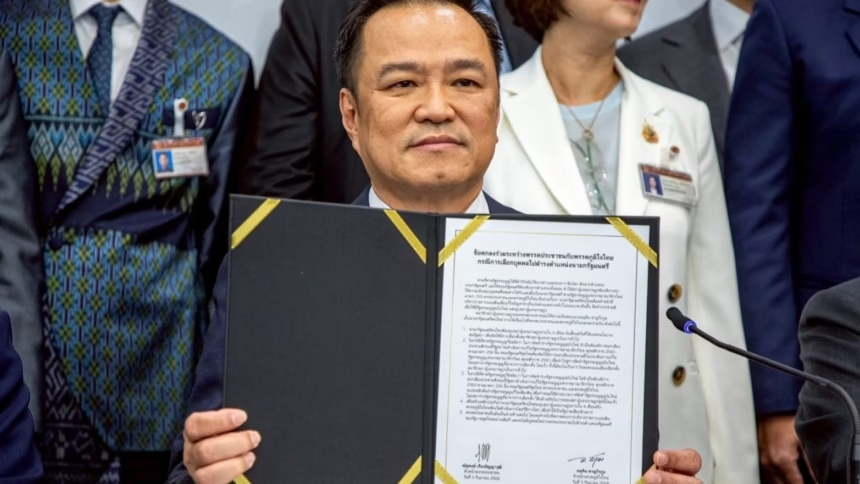BANGKOK – Exhausted by constant political change, Thailand welcomed its third prime minister in two years on 24 September 2025. Anutin Charnvirakul, leader of the Bhumjaithai Party (BJT), took the oath of office along with a 35-member cabinet at the Grand Palace, in a ceremony attended by King Maha Vajiralongkorn.
His rise followed a chaotic summer. Former prime minister Paetongtarn Shinawatra was removed from office in August after a 6 3 Constitutional Court ruling found ethics violations. That verdict triggered fierce behind-the-scenes bargaining among conservative parties and power brokers. The wrangling ended on 5 September, when parliament backed Anutin for premier by 314 votes to 265.
Anutin, 58, is a construction tycoon and former interior minister known for his hard line on drugs and immigration. He now heads a fragile minority coalition in which military-linked parties such as Palang Pracharath and United Thai Nation hold key influence. Opponents describe the new government as a reset shaped by royalist and conservative interests. Supporters argue it protects Thailand from what they see as reckless populism.
Fresh elections are expected by mid-2026, so the coalition is moving at speed. On 29 September, the government presented its policy statement to parliament, putting economic recovery, national security, and new rules for foreign residents at the top of its list. Thailand hosts around 1.2 million expats, so any change hits a large and diverse group.
The policy outline signals a shift away from the Shinawatra-style mix of business-friendly policies and mass appeal spending. In its place stands a more nationalist, revenue-driven approach. For years, relatively loose rules, warm weather, and low living costs have pulled in retirees, long-term visitors, digital workers, and foreign investors. That set up is now being reshaped by five major policy changes.
These measures, some already active, others moving quickly through legal channels, tighten visas, reduce tax avoidance, and raise barriers around foreign business and property. The government argues it needs extra income as growth in 2026 is forecast at about 2.5 per cent. Many expats feel less welcome. As a British retiree in Pattaya joked over coffee in Jomtien, people have swapped easy beach life for a flood of new paperwork.
The sections below look at how each change affects foreign residents, from Bangkok offices to Phuket condos.
Shift 1: Visa Overhaul, From Easy Entry To Strict Control
The first shock to foreign residents came through an executive decree that took effect on 1 October 2025. Amendments to the Immigration Act sharply restricted visa rules and the way permits are issued.
Long stays on tourist visas, once extended in 60-day blocks with few questions asked, are now far harder to secure. The Thailand Elite Visa programme, previously a popular choice for wealthy foreigners at 900,000 baht (around 26,000 US dollars) for a five-year stay, has become far stricter. Applicants must now show proof of annual tax filing and hold health insurance with coverage above 1 million baht.
Anutin, who also keeps control of the interior ministry, told parliament that national security requires clearer data on who stays in the country and how they support themselves. He repeated BJT’s talking points on stopping border hopping by digital workers who live in Thailand but pay tax elsewhere.
For more than 300,000 long-term visa holders, the changes have a retroactive twist. By 31 December 2025, every foreign resident who has stayed more than 180 days in a year must file a new Residency Compliance Report through the e-Visa portal. The report will link their presence in Thailand to records at the Revenue Department.
Those who fail to comply face steep penalties. Overstay fines now stand at 1,000 baht per day, capped at 100,000 baht, and repeat offenders risk deportation. The message is simple. Long stays now come with strict reporting and closer monitoring.
The group feeling the sharpest impact is holders of non-immigrant business visas, or Non-B visas. Around 150,000 foreigners use this route to work for Thai companies or run their own firms. Under the new rules, every work permit must be linked to an employer who pays a minimum salary of 50,000 baht per month, up from 30,000. Companies face quarterly checks to stop fake or so-called ghost positions created solely to maintain visas.
On 1 November, a pilot system started in Bangkok and Chiang Mai. It uses facial recognition at airports and cross-checks passport data with tax ID records to flag mismatches between entry stamps and declared employment.
Some foreign entrepreneurs are already feeling the strain. An Australian running a wellness retreat in Koh Samui shared that he renewed his visa only to discover that his Australian pension now counts as taxable income in Thailand, which he had never reported. He described the new environment as chaotic and uncertain.
Human Rights Watch, in a report published on 19 November, warned that tighter control over visas and residency data could also feed into broader crackdowns, including cases involving lèse majesté. Officials reply that the measures are about revenue and border control, not politics. What is clear is that the state expects a sizeable payoff. Visa fee income is projected to rise by about 40 per cent to 15 billion baht per year, money that will fund new border technology.
Shift 2: Tax Shake Up, Global Income Now On The Radar
While visa rules decide who stays in Thailand, tax reforms decide how much they pay. From 1 January 2025, Thailand moved to a stricter interpretation of its global income tax system. Anutin’s cabinet then sped up enforcement with a Royal Decree on 10 November.
Under the revised Personal Income Tax Act, any foreigner who spends 180 days or more in Thailand in a calendar year is treated as a tax resident. That person can now be taxed at rates up to 35 per cent on worldwide income that is brought into Thailand.
The most dramatic shift concerns how foreign income is treated when it is transferred. In the past, income earned overseas could avoid Thai tax if it was brought into the country after the end of the tax year in which it was earned. That door is now closed for income from 2024 onwards. Any foreign income transferred into Thailand after 1 January 2026 can be taxed, no matter when it was earned, as long as it falls within the new rules.
Finance Minister Pichai Chunhavajira said the goal is to reduce the use of offshore accounts and align Thai rules with standards pushed by the OECD and major economies, including the United States. The Revenue Department plans to match declarations with data from 47 double taxation treaties. Expats who underreport could face audits and heavy penalties.
For many foreign retirees, the change means a new tax bill where none existed before. A person drawing 50,000 US dollars a year from a pension abroad could now face a tax charge in Thailand of roughly 200,000 baht (about 5,800 US dollars), depending on deductions and treaty protection.
Digital workers and consultants, often called nomads, face extra scrutiny. The government estimates that about 100,000 foreigners live in Thailand while working for clients overseas. A new tool called the Nomad Tax Tracker app will require them to report remittances every quarter. If they hide income and the tax office later finds out, they can be fined up to twice the unpaid amount.
Some expats are already weighing their options. A Swiss consultant based in Hua Hin told this reporter that he had hoped to semi-retire in Thailand, but now looks at Vietnam as a possible alternative.
There are a few softer spots in the policy. Income earned abroad and brought into Thailand in 2023 and 2024 will enjoy a grace period until 2027. Executives placed in Thailand under the Board of Investment schemes keep access to fast-track deductions and some tax holidays.
Even so, ASEAN Briefing predicts that the tighter regime could bring in around 50 billion baht to the state budget, revenue that officials say can support public health and social programmes, with expats footing part of the bill.
Shift 3: Stricter Business Rules, Ownership Caps, And Hiring Targets
The third major shift comes in the business sector. Anutin has long spoken in favour of stronger Thai control over key parts of the economy. That approach now shapes new amendments to the Foreign Business Act, which were published in the Royal Gazette on 15 October 2025.
The law still caps foreign ownership at 49 per cent in restricted areas such as real estate, media, and retail. The change lies in enforcement. Authorities now have the power to claw back assets if they find that foreign investors used Thai nominees or complex structures to bypass the cap. Companies have six months to adjust before legal action begins.
Anutin summed up the policy with a short phrase. Thailand comes first. Officials say around 20,000 foreign-run small and medium-sized businesses may be using Thai proxies on paper while foreign owners actually control decisions.
The hospitality and tech sectors feel exposed. Bars, guesthouses, restaurants, and small hotels across tourist zones often rely on foreign capital and management. Under the new rules, businesses must raise the share of Thai staff from 50 per cent to at least 70 per cent. Daily minimum wages in tourist-heavy provinces climb to 400 baht.
To police the changes, the Commerce Ministry has formed a Business Integrity Bureau. It plans to audit about 5,000 firms each year. Authorities say they will use blockchain-based tools to track shareholding structures and uncover hidden ownership.
Property markets are also under pressure. Phuket’s condo sector, where foreign buyers account for about 30 per cent of demand, has already seen a drop in prices. New buyers who are not Thai now need to show ten years of legal residency before they can purchase certain units. Agents report that listing prices have fallen by around 15 per cent in some developments.
At the same time, the government is still courting investment in some advanced industries. Board of Investment packages for green and high-tech projects, such as electric vehicle production, offer tax holidays for up to eight years.
Yet foreign partners must accept minority stakes to qualify, which may deter some multinational firms. Bloomberg noted after Anutin’s swearing in that foreign direct investment had already fallen 12 per cent in the third quarter of 2025, raising concern about future inflows.
Expats working in sectors that fit the new model often see the situation with mixed feelings. A German engineer in Rayong’s auto corridor described the changes as painful in the short term but likely to support more stable growth if managed well, even if foreign owners lose some influence.
Shift 4: Health Care And Welfare, Priority For Citizens
The fourth shift focuses on public services. Changes to the Universal Coverage Scheme, which took effect on 1 November, formally remove foreign residents from subsidised state health care. From now on, most expats must rely on private health insurance.
The cost is not small. Comprehensive annual policies suitable for long-stay expats now average around 30,000 baht per year, and proof of cover is tied to visa renewal in many categories. Without valid insurance, visas can be refused.
Health Minister Somsak Thepsutin has been blunt. He argues that public hospitals cannot keep absorbing the cost of treating uninsured foreigners, especially in tourist zones where drink and accident-related cases are common. The ministry plans to redirect about 100 billion baht from current spending patterns into rural clinics and district hospitals.
Rules on foreign pensions and social benefits have tightened as well. Money from overseas retirement funds must be declared as taxable income when remitted, adding to the burden on retirees who had counted on low living costs.
In Chiang Mai and other expat hubs, clinics already report a sharp rise in foreigners paying out of pocket rather than joining local schemes. Some older residents now delay treatment or travel back to their home country for major procedures.
Shift 5: Environmental And Property Rules, Tougher Coastal Protection
The final major policy set centres on the coast and property development. The cabinet approved the Coastal Zone Management Act on 20 October, and it has serious consequences for foreign buyers in popular seaside provinces.
The law bans foreign individuals from buying land within two kilometres of the shoreline. That rule hits luxury villa projects and resort-style estates in areas such as Krabi, Koh Phangan, and parts of Phuket that have marketed themselves heavily to foreign owners.
In addition to purchase limits, annual eco fees for villa owners rise steeply to 50,000 baht. The Environment Ministry says the money will support mangrove restoration, erosion control, and waste management in sensitive marine zones.
Environment Minister Patcharawat Chiam aaruk summed up the message in simple terms. Long-term protection matters more than speculation. For expats who already own coastal properties, new assessments could cut the formal value of their holdings, with some agents warning that prices may drop by half if foreign demand dries up.
Living With The Changes: Adapting To A Tougher Climate
As Anutin’s coalition finds its feet, it has received a cautious nod from the IMF for its focus on balancing the books and tightening revenue collection. That encouragement gives the government some cover at home, even as foreign residents reassess their plans.
Wealth advisers, such as Titan Wealth, report a sharp rise in requests from expats looking for legal ways to adjust tax exposure or shift assets. Relocation firms in border provinces say they see growing interest in moves to Cambodia and other nearby countries with lighter tax and ownership rules.
Yet Thailand still holds strong appeal. The country enjoys good infrastructure, world-class tourism services, and a projected tourism rebound worth around 1.5 trillion baht. Anutin has also pledged to push growth to 5 per cent through new spending and upgrades in the Eastern Economic Corridor, including ports, rail links, and industrial clusters.
For long-time observers of Thai politics, from successive coups to fragile coalitions, the message to foreigners is blunt. The Thai state wants more control and more revenue from those who live, work, and invest within its borders.
Expats who wish to stay need to adjust quickly. They will have to keep cleaner tax records, maintain valid insurance, respect ownership limits, and treat visas as a privilege that comes with constant checks.
The Land of Smiles has not lost its charm, but its welcome now comes with fine print. For many, that means less focus on sunsets and more time with accountants.
Related News:
Tourist Police Warn Over Scams Targeting Tourists in Thailand













